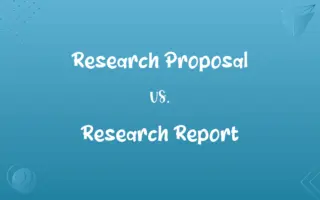JDBC vs. ODBC: What's the Difference?
Edited by Aimie Carlson || By Harlon Moss || Updated on October 17, 2023
JDBC is a Java-based API for connecting to relational databases, while ODBC is a platform-independent interface for connecting various databases.

Key Differences
JDBC, which stands for Java Database Connectivity, is an API specifically designed for Java applications to interact with relational databases. ODBC, or Open Database Connectivity, is a broader interface used to connect applications, regardless of their development language, to various databases.
JDBC is inherently designed for the Java language, ensuring seamless integration and efficient database connectivity for Java-based applications. In contrast, ODBC serves as a bridge for applications of any language to connect with databases, making it more generic and platform-independent.
One of the distinctions between JDBC and ODBC is their target audience. While JDBC primarily caters to Java developers, ODBC can be utilized by developers working in multiple languages or environments.
Moreover, JDBC can connect directly to a database using a native protocol, but ODBC often requires a driver manager to establish connections. This intermediary step can sometimes introduce additional complexity in the connection process for ODBC.
In essence, while both JDBC and ODBC serve the purpose of connecting applications to databases, JDBC is Java-centric and can directly connect using native protocols, whereas ODBC is universal but may require intermediaries for some connections.
ADVERTISEMENT
Comparison Chart
Designed For
Java applications
Applications in any language
Connection
Direct using native protocols
May require a driver manager
Scope
Specific to Java
Universal and platform-independent
Driver Type
JDBC driver
ODBC driver
Language Dependency
Java-based
Language-independent
ADVERTISEMENT
JDBC and ODBC Definitions
JDBC
A Java API for connecting to relational databases.
Using JDBC, the application seamlessly retrieved data from the SQL database.
ODBC
A middleware solution facilitating application and database communication.
ODBC served as the bridge between the application and the remote database.
JDBC
A Java-centric database connectivity interface.
JDBC provides efficient database integration for Java applications.
ODBC
A platform-independent protocol for database connections.
Despite the diverse software platforms, ODBC ensured consistent database access.
JDBC
Java's solution for database-independent connectivity.
Regardless of the database type, JDBC ensured consistent connectivity.
ODBC
An interface allowing applications to use SQL queries across platforms.
With ODBC, the application executed SQL statements on multiple operating systems.
JDBC
A protocol enabling Java applications to execute SQL statements.
The developer employed JDBC to run the SQL query within the Java code.
ODBC
A universal database connectivity interface.
ODBC enabled the software to connect to various database systems effortlessly.
JDBC
A bridge between Java applications and relational databases.
JDBC acted as the intermediary, facilitating the data exchange.
ODBC
A driver-based standard for accessing different databases.
The application utilized an ODBC driver to fetch data from the Oracle database.
FAQs
What is JDBC?
JDBC is an API in Java that allows programs to interact with databases using SQL.
What is the purpose of a JDBC driver?
A JDBC driver facilitates connection between a Java application and a database, converting JDBC calls into database-specific calls.
Are stored procedures supported in JDBC?
Yes, stored procedures can be invoked using the CallableStatement interface.
How is exception handling managed in JDBC?
JDBC uses the SQLException class to handle database-related exceptions.
Which databases are supported by JDBC?
JDBC can connect to any relational database, provided the appropriate driver is available.
What is a ResultSet in JDBC?
ResultSet is an object that stores the data retrieved from a database after executing a query.
Who introduced ODBC?
ODBC was introduced by Microsoft.
How can one set up an ODBC connection?
One can set up an ODBC connection through the ODBC Data Source Administrator tool, configuring the DSN with necessary database details.
What are the main components of JDBC?
JDBC consists of the JDBC API, JDBC Driver Manager, and various drivers.
How do you connect to a database using JDBC?
By using the DriverManager.getConnection() method with the database URL, username, and password.
Is it possible to perform batch processing with JDBC?
Yes, using the addBatch() method and executeBatch() method, multiple SQL commands can be executed together.
Can ODBC be used with non-relational databases?
While ODBC was designed for relational databases, drivers for some non-relational databases do exist.
Are there performance differences between ODBC and native database APIs?
ODBC can be slower due to its generic nature, but this varies based on implementation and specific use cases.
What is the relationship between ODBC and SQL?
ODBC uses SQL as its database query language, providing a common interface for various database systems.
What are the types of JDBC drivers?
JDBC-ODBC bridge, Native-API driver, Network Protocol driver, and Thin driver.
What are the main components of ODBC?
ODBC consists of an ODBC driver, Driver Manager, and ODBC Data Source Administrator.
Is JDBC related to ODBC?
JDBC and ODBC serve similar purposes, but JDBC is specific to Java. The JDBC-ODBC bridge allows Java applications to use ODBC drivers.
What is ODBC?
ODBC is a standard API for connecting applications to databases, irrespective of database systems and programming languages.
How does ODBC work?
ODBC uses drivers to translate application queries into commands understood by specific databases.
What is a DSN in ODBC?
DSN (Data Source Name) is a configuration that stores the database connection information used by ODBC.
About Author
Written by
Harlon MossHarlon is a seasoned quality moderator and accomplished content writer for Difference Wiki. An alumnus of the prestigious University of California, he earned his degree in Computer Science. Leveraging his academic background, Harlon brings a meticulous and informed perspective to his work, ensuring content accuracy and excellence.
Edited by
Aimie CarlsonAimie Carlson, holding a master's degree in English literature, is a fervent English language enthusiast. She lends her writing talents to Difference Wiki, a prominent website that specializes in comparisons, offering readers insightful analyses that both captivate and inform.






































































